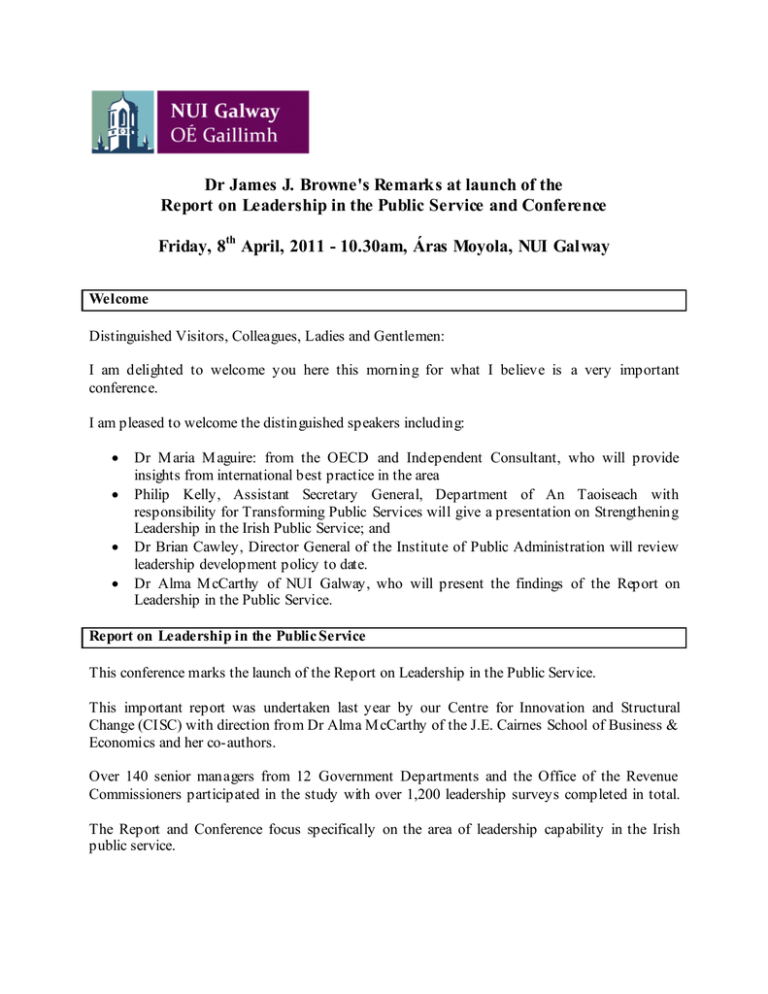Dr James J. Browne's Remarks at launch of the
advertisement

Dr James J. Browne's Remarks at launch of the Report on Leadership in the Public Service and Conference Friday, 8th April, 2011 - 10.30am, Áras Moyola, NUI Galway Welcome Distinguished Visitors, Colleagues, Ladies and Gentlemen: I am delighted to welcome you here this morning for what I believe is a very important conference. I am pleased to welcome the distinguished speakers including: Dr M aria M aguire: from the OECD and Independent Consultant, who will provide insights from international best practice in the area Philip Kelly, Assistant Secretary General, Department of An Taoiseach with responsibility for Transforming Public Services will give a presentation on Strengthening Leadership in the Irish Public Service; and Dr Brian Cawley, Director General of the Institute of Public Administration will review leadership development policy to date. Dr Alma M cCarthy of NUI Galway, who will present the findings of the Report on Leadership in the Public Service. Report on Leadership in the Public Service This conference marks the launch of the Report on Leadership in the Public Service. This important report was undertaken last year by our Centre for Innovation and Structural Change (CISC) with direction from Dr Alma M cCarthy of the J.E. Cairnes School of Business & Economics and her co-authors. Over 140 senior managers from 12 Government Departments and the Office of the Revenue Commissioners participated in the study with over 1,200 leadership surveys completed in total. The Report and Conference focus specifically on the area of leadership capability in the Irish public service. This is very timely in the context of the new Government’s focus on reform, and the establishment of a new M inistry for Public Expenditure and Reform, held by M inister Brendan Howlin. Link with NUI Galway Clearly any consideration of the nature of public service leadership must take account of the political context. Two weeks ago at another conference in NUI Galway on Executive Accountability and Parliamentary Democracy, organised by colleagues in the School of Law, we heard from a range of speakers (including the Ombudsman and former Supreme Court Judge, Catherine M cGuinness.) Some of the points which emerged there are relevant. I'd like to draw attention to some of these insights, in the context of the contents of the report launched today. Role of the Minister / Civil Servant Within the Irish public service individual Government ministers are, in a formal legal sense, responsible for their departments as ‘corporations sole’ – that is entities which stand alone. Civil servants work for the government, usually a government department, but not for government ministers. Commentators have spoken of the protective allegiance of civil servants to a M inister; and have urged reform of a system where senior civil servants obtain preferment on the basis of keeping things safe and avoiding change at all costs. A robust, independent and rational public service must be free from any suspicion of political clientelism. Civil servants, especially senior civil servants, must feel free to act with true accountability and transparency. Senior civil servants who are now charged by Government with initiating reform and managing change must be free to do this. The Need for Leadership This brings us to the subject of today’s conference. It is almost self-evident to say that effective leadership is critical to reform and to the management of change. This fine study of Leadership in the Irish Public Service confirms this. PAGE 2 The study points up: The risk averse context of the public sector The rigidity of public sector structures Poor internal communications The challenge of managing resources effectively The Constraints on recruitment, selection and promotion Finally, the lack of systems to enforce accountability. It seems to me that all of this can be summarised in one phrase: Senior leaders are currently managing and leading without the authority or indeed adequate control mechanisms to effect real change. It also seems to me, speaking as someone who has the responsibility of leading this University, that this encapsulates the challenge facing leaders in the civil service, and indeed the wider public sector. Ireland Inc. Our country is facing a severe crisis in its public finances. It is not simply a major recession. The dislocation in our economy is such that we need to recast our systems and structures and indeed our wider public sector. The Ireland which emerges from this crisis will be a very different place. The public sector and the civil service which will underpin this new economy and new society will also be very different. We need leaders in the civil service and the public sector who will rise to the challenge and make the necessary changes. But even the best people, and the best leaders, will be defeated by poor systems. Principle of Subsidiarity The danger we face now, as we struggle to correct our public finances, is that we put in place systems, which while designed to achieve this, will further dis-empower public sector leaders and compromise the change which is so necessary. Centralising control and decision making, while certainly maintaining control over spending, could well inadvertently inhibit change at operational level. If the civil service and public sector are to change, then leaders must have the authority to lead while, of course, being fully accountable for their budgets and their organisations. I am arguing for a system where senior managers in the public sector are given defined budgets and are responsible for outputs within their organisation. PAGE 3 Leaders and managers must have the freedom to allocate resources and to change processes while working within these budgets and achieving agreed outputs. There is no role, in my view, for a central ‘control’ authority, in second guessing processes, procedures and decisions made at local level, provided always, of course, that decisions are made in accordance with best practice and good governance and are within agreed budgets. It seems to me that the principle of subsidiarity is one which we might adopt more widely and with profit across the public sector. Decisions are best made close to the point of their implementation. Certainly policy, and indeed, wider strategy must be agreed and communicated from the centre. Decisions and their implementation should be devolved to those who have the knowledge and the evidence necessary to inform good decision making. The issue of staffing and promotion in the Universities is a good example: The Department of Finance of course have a legitimate concern for the budgets of Universities. Further, given the nature of public sector pension provision the Department has a valid interest and concern for headcount. But once these targets are agreed and provided they are met, Finance or for that matter Education and Science, have no grounds for involving themselves in the details of recruitment and promotion etc. This in essence is at the root of the recent public controversy surrounding the Employment Control Framework. The application of the principle of subsidiarity would leave these decisions to local leadership. In short it would empower leaders to lead! Conclusion / Thanks Back then to the report we are launching today. While as I have said it rightly in my view speaks to the challenges of leading reform and change within the existing civil service structures, I am also struck by the positive attitudes which are expressed in the Report. The Report highlights A refreshing and acute self-awareness among senior civil servants; A strong belief in the mission and the role of the Public Service by civil servants; And a well-articulated need for reform and leadership expressed by senior civil servants. PAGE 4 This gives us tremendous confidence for the future development of the Public Service. Formal Launch of Report Let me conclude then by formally launching the Report on Leadership in the Public Service. I commend all who were involved in its production. I wish this Conference every success and I look forward to its stimulating and thought provoking output. PAGE 5



